- Home
- Hammond Innes
Solomons Seal Page 5
Solomons Seal Read online
Page 5
‘It’s your money,’ I told him.
He laughed. ‘You remember somebody suggesting a long time ago that ocean racing was like tearing up fivers under a cold shower? Well, stamps are a bit like that. You get a hunch, a feel about something, and then you become so obsessed you’ve got to have it whatever the cost.’
He saw me to my car, and as I was getting into it, I remembered what he had said to me on the phone, that something very odd about those die proofs had come to light. I asked him what it was, but he laughed and shook his head. ‘When you’ve got more time and are prepared to show a little more interest—’
‘I’m a lot more interested now you’ve upped your bid by such a large amount.’
‘If I get the collection, then I’ll tell you. Okay?’
I was annoyed with myself then, wishing I weren’t already late for my appointment. All I could think of as I drove fast through the quiet Essex countryside was his extraordinary behaviour. I had no idea what his financial position was, but he lived quite modestly, certainly within his pension, and though he presumably made a profit out of buying and selling stamps, I was sure an offer like that would be stretching his resources. I had seen quite a bit of him since his wife had died a couple of years back. I liked him, and not doubting for a moment that his original valuation had been arrived at in good faith, I was afraid he had been carried away and was offering too high a price.
I was almost a quarter of an hour late when I turned into the concrete driveway, and from two fields away, just after I had hit the dirt track, I could see Rowlinson’s Aston Martin standing outside the hall. I found him sitting under the walnut tree by the moat, watching a pair of mallards, his dark, almost Welsh features brooding and sullen.
‘Sorry I’m late,’ I said. ‘Can I offer you a drink?’
‘No thanks.’ He tossed the broken half of an old walnut shell into the water. ‘I’m afraid I’ve some bad news for you. I’m selling.’ He didn’t look up, just sat there staring into the water. ‘Not your fault. Your ideas were fine, and I think they’d have worked. But I can’t fight Bessie and the board. We’ve decided to expand further, and we need the money.’ He picked up another walnut shell, breaking it between his fingers. ‘Doesn’t look as though I’ll have time for any more long trips, so no point in hanging on to the property. Pity. But there it is.’
I stood there, not saying anything. There was nothing to say with my hopes dashed like that. I had known Chips Rowlinson for about six years, ever since I had sold him a new engine for his boat and arranged its installation. Then, after I had taken the job with Browne, Baker & Browne, I learned he was looking for a larger residence. I was lucky, I managed to find him a lovely old manor house near Tolleshunt D’Arcy, and I got him the land to go with it much cheaper than he expected. As a result, he had come to regard me as his land and agricultural adviser, which was why he had turned to me when the rundown sheep station with the ridiculous name of Munnobungle had become a problem. I had looked at the rainfall figures in that part of Queensland, and I was certain deeper boreholes and a switch to cattle and sorghum would help to make it profitable. It just needed somebody there to get the place back on its feet. ‘I’m sorry you’ve decided to sell,’ I murmured.
‘So am I.’ He got slowly to his feet. ‘Don’t think I want to. I’ve had a lot of fun out of it. Marvellous country.’ And he began talking in that quick, energetic way of his about the climate and the people, the sense of space, and trips he had made out to the Barrier Reef in fishing boats and in a Cessna he had hired from an outfit called Bush Pilots Airways. He was pacing up and down the edge of the moat, his head up as though sniffing the air. ‘You know, I’ve half a mind to pack it in here, let the tax boys have their last bite at me and go out there for good. There’s a sense of freedom, like a breath of fresh air. The sea, the fish, all that coral, and over the horizon to the north-east islands hardly anybody has ever seen. The Solomons, the Bismarcks; I never got as far as that. Only Papua New Guinea. But that was enough. One of the last lost primitive frontiers.’
‘Primitive enough to believe in magic?’ I asked. ‘Death wishes? That sort of thing?’
‘Oh, yes. It’s witchcraft really, but they call it sorcery.’ He had stopped and was staring out at the moat. ‘I was at Mendi, and there was a young Australian lawyer staying at the hotel with me, running a course for local village magistrates, and he had just come face to face with this problem. What the devil does a magistrate, or a High Court judge for that matter, do when a case is brought against a man for putting a death wish on another? Is it murder? Difficult under our laws. No physical attack, no weapons. But they know it’s murder, and if the law doesn’t act, then the relatives will. They’ll take the law into their own hands. They call it pay-back. It’s feuding, of course. Can go on for generations.’
‘And the Administration, the district officers – a patrol officer, for instance, would he believe in it?’
‘Yes, I imagine so. I did see it once myself. Not in Papua New Guinea, in West Africa, when I was a sapper there. I had a company out in the bush throwing a Bailey bridge over a swollen river, and my best sergeant went sick on me. Nothing obviously wrong, only that he’d had a go at another man’s wife in a nearby village and the local witch doctor had been paid to put a spell on him. Medicines didn’t do any good, so I had to go and search the old wizard out, buy him off and the injured man as well.’
‘And your sergeant recovered?’
‘Oh yes, once he knew the death wish was lifted. Funny thing is that this sort of magic doesn’t seem to be an oral or even a visual art. The sorcerer seems able to do it by remote control, by telepathy.’ He was silent a moment, still staring into the moat, which was now becoming shadowed from the rays of the sinking sun. ‘Quite honestly,’ he said quietly, ‘it’s something I can do without. It’s quite beyond my comprehension, and I don’t want to know about it.’
His acceptance of it, the way he had reacted to it – a hard-headed businessman … I was appalled. Here in England, in this most mechanical, most material of all ages … ‘When you were out there,’ I said, ‘did you ever hear the name Holland mentioned?’ And when he looked at me with a surprised lift of his eyebrows, I added, ‘There was a Carlos Holland ran ships in the islands around the turn of the century.’
He shook his head. ‘Queenslanders aren’t much interested in the past. Life’s too hard, and they live for the present. What they talk about mostly is the price of sheep or cattle or sugar, and how that randy old sport out at Dead Horse Springs has shacked up with some raw kid up from Brisbane. And if they do mention the past at all, it’s to curse the Chinks for mining out all the gold on the Palmer River.’
He had spent a week up in the Highlands of Papua New Guinea, and he talked about that for a moment, how the people there had developed their pig and cassowary economy to a degree of complexity that was quite as difficult for the uninitiated to comprehend as the City’s dealings in stocks and shares. ‘But the rich man, the banker as you might say, doesn’t lend, he borrows, so that individuals, sometimes whole clans, become tied to him. Splendid fellows,’ he added. ‘A real fighting people who are not averse to a little cannibalism if it will increase their virility.’ I think he saw my mind had strayed, for he suddenly switched back to my question. ‘No, the only Holland I ever heard of was a fellow called Black Holland. He was killed by an abo half-breed in a bar brawl up near Ingham. Lewis, that was the abo’s name. He was tried for murder. Queer fellow, you buy him a drink and he’ll tell you a tall tale about some forgotten gold mine.’
‘How would an aborigine have come by a name like Holland?’ I asked.
‘His father, of course.’ His tone was terse, as though suddenly bored. ‘If the father is white, they’ll cling to the name, like all those hyphenated Smiths. Human nature is much the same everywhere. But Black Holland wasn’t an abo. He was from the islands. Bougainville, I think.’ He dropped the subject then. ‘Now, about Australia. I know you were very s
et on the idea of going out there to look after my interests. That’s why I wanted to tell you the situation myself. The final decision to expand was only taken yesterday.’ He was staring up into my face very intently. After a moment he said, ‘But I do need somebody I can trust to go out there and organise the sale of the property. Will you do that for me? All expenses paid, of course.’
I didn’t say anything for a moment, as I tried to readjust to this totally different offer. It wasn’t at all what I had been hoping for, but at least it would give me a chance to see whether there was more of a future for me out there than there seemed to be here in England. I think he misunderstood my silence, for he said, ‘I’m not leaving it to some smart-alec land agent out there. Like as not, he’d take me for a ride. Can’t blame him, a Pommie with a lot of land and nobody looking after his interests. I’d be a sitting duck. Well?’
‘I’ll think about it,’ I said.
He stared at me a moment longer. ‘Tell you what I’ll do. You’ve been through all the figures. You know what I paid for the place. I’ll give you a percentage of the net difference between my purchase price and whatever you manage to get for it. Say ten per cent. Would that help?’ And without waiting for a reply, he turned abruptly and walked to his car.
He had bought Munnobungle early in the seventies, when Australian land prices were almost at bottom. There had been massive inflation since then, and with a good local agent the price should be very much higher now, even if the exchange rate was against him. As soon as he was in the driving seat, he lowered the electric window. ‘You get a good deal for me and you’ll have a nice little packet of Australian dollars. Not a bad start if you’re thinking of settling there.’ He was looking up at me, smiling. ‘We’re having another board meeting day after tomorrow, a lunch afterwards. Why not join us? One o’clock at the factory. That gives you time to think it over.’ And he drove off, taking my acceptance for granted.
At the office next morning there was a handwritten envelope marked ‘Personal’ among the correspondence lying opened on my desk. It was a brief note from Miss Holland to say she had been offered a job as stewardess on a cruise ship, and would I be kind enough to sell the stamps for her and forward whatever I got for the collection, less commission and any expenses, to the credit of her account at the Southampton branch of the National Westminster Bank?
The writing was small and neat, slightly angular, so that it was not noticeably feminine, and she signed herself Perenna Holland. I had never come across the name Perenna before. There was no address, and the note had been scribbled on what appeared to be a half-sheet of typing paper. The cheap buff envelope in which it had been enclosed was post-marked Southampton. I dialled her solicitor’s number, and as soon as I was put through to him, he said in that high, precise voice of his, ‘I was just about to phone you.’
‘You’ve heard from Miss Holland, have you?’
‘Yes. She’s sent me a Power of Attorney and asked me to arrange for the sale of the house as well as the contents as soon as possible. Fortunately I now have the agreement of the mortgagors, so we can go ahead. I’d like you to handle that for us, if you will – since you were kind enough to give us a rough guide to the market value.’
‘Who drew up the Power of Attorney?’ I asked. ‘Was it a firm in Southampton?’
‘Ah, you’ve heard from her, too, have you? Yes, it was a Commissioner for Oaths at Southampton. And you were right when you said she seemed anxious to get away. She’s got a job on a cruise ship.’
I asked him for her address, but it was the same she had given me, the bank. She hadn’t said what ship she was sailing on or where it was going. It was all ‘very odd’, he thought. I told him we would deal with the sale of the house, and after I had put the phone down, I rang Lloyd’s Intelligence Services at Colchester. It took only a moment for them to check the Southampton sailings on the computer. A Greek cruise ship, the Lemnos, had left at 20.30 hours the previous evening for the Caribbean, calling at Madeira en route. No other cruise ship was due to sail from Southampton for the next eight days.
‘When will the Lemnos return?’ I asked. But they weren’t sure she would dock at Southampton again. It was a fortnight’s cruise, finishing up in Bermuda. The ship would then embark mainly American passengers for a further cruise through the Panama Canal to the Galápagos, then down to Callao and Valparaiso, finishing up at San Francisco on August 2. That was as far as their information went.
It wasn’t much, but at least I knew that she had sailed, and on a vessel headed for the Pacific. I sat there for a moment remembering the things she had said, the atmosphere of that house, wondering how much Eric Chandler knew about the family.
I was still thinking about that when the phone rang. It was the chairman of the Rotary Club. Would I take the chair for him at today’s lunch as his wife had suddenly been taken ill? There was a lot of work to get through, and it was only as I was leaving that I remembered Berners was coming at three. I gave the two albums to Miss Paget and told her to remain with him the whole time he was looking through them.
By the time I got back from lunch Berners was in my office with Miss Paget, the albums open on the desk in front of him. He was a small, thrusting little man, expensively dressed in a dark grey suit, rather square at the shoulders, and a gaily patterned bow tie. He got quickly to his feet, bowing slightly and giving me a limp handshake. As soon as we were alone, he said, ‘Your description of the last few pages of the collection was exact, Mr Slingsby. They’re undoubtedly die proofs, and the stamp is the one that interests my client.’ He folded his neat pale hands across his stomach, a signet ring glinting in the sunlight that streamed in through the open window. ‘Now, if I make you an offer, are you in a position to deal?’
‘Yes.’ I sat down at my desk, waving him to the chair opposite.
‘So, you have heard from Miss Holland.’
‘This morning.’
‘Then perhaps you will inform me what figure I have to beat.’
‘A high one,’ I said, wondering once again whether Tubby really wanted the collection at that price or if I should try to get him off the hook. But looking at Berners, I didn’t think I could. He was so obviously a hard bargainer.
He stared at me for a moment, his eyes coldly grey and very shrewd behind thick-lensed glasses. ‘How much?’
‘Suppose you name a figure?’
‘This is not an auction.’ His thin lips were compressed into a sour little smile, and he shook his head. ‘First, let me say that the value of this collection for anyone not specifically interested in the Solomons Seal label – and it is no more than that, you understand, it is not in any sense a postage stamp …’ He hesitated. ‘The value is perhaps one thousand pounds. That is, to a dealer.’
Allowing for the fact that he was pitching it as low as possible, it was close enough to Tubby’s valuation to make nonsense of his subsequent offer. I said, ‘But you are interested. So what is your offer?’
He shook his head, still with that sour little smile. ‘I don’t make any offer until I know how much I have to beat. I think in fairness to your client, to Miss Holland, you have to tell me that. You say it is high.’
‘Very high,’ I told him.
‘Higher than one thousand pounds?’
‘Much higher.’
He frowned, his hand moving up to his blue jowls and the high dome of his forehead catching the light. The hand came away, the head thrust forward. ‘You have this offer in writing?’
‘Yes.’
‘Show me. I don’t believe it.’
I started to tell him that I wasn’t accustomed to having my word doubted, but I checked myself. The figure was so preposterous that in his shoes I would have been equally incredulous. ‘All right,’ I said, and I took Tubby’s letter from the drawer in my desk and handed it to him.
He picked it up, holding it close to his face. ‘C’est incroyable!’ he breathed. ‘Who is this?’ He peered closely at the signature. ‘J. L. Sawyer
. A dealer?’ he asked. ‘Yes. I remember now. I have met him. An amateur.’ He said it half in contempt, half in wonder. And then he looked at me over the top of the letter. ‘Have you had any other offers?’
I shook my head.
‘Then why does he go directly to this very high figure of twenty-five hundred pounds? It cannot be for the “Lady McLeod” Trinidad stamp; that is in too poor condition.’
‘I’ve no idea,’ I said. ‘He just seems fascinated by the collection as a whole, and by the proofs, of course.’
‘Why? What is his interest?’
‘He seems to think it has great curiosity value.’
‘He wants it for himself then, not for a client?’
‘Yes, for himself.’
He shook his head as though in wonderment at the stupidity of it. ‘Well, I’m not sure now. For myself I could not go beyond fifteen hundred pounds, maybe a little more. But above his figure, no – not on my own responsibility, you understand.’ He had been speaking slowly, more to himself than to me. Then abruptly he put the bid letter down on the desk. ‘You must give me a little time. I have to consult my client about this.’
‘Miss Holland needs the money,’ I said. ‘If you would like to use my phone.’
But he shook his head. ‘My client is not in England any more. He is somewhere in Europe, I think. You must wait a little, until I can contact him.’
‘How long?’
‘A fortnight, three weeks – I’m not sure. Shall we say a month? I expect him to be in England again sometime next month.’
I hesitated. A month would take us to July 23. That would be running it fine if she was leaving the ship at Callao or Valparaiso. ‘I’ll give you three weeks.’
He seemed about to argue, but then abruptly he nodded. ‘Three weeks then. Meantime, I have your word that you do not sell to this man Sawyer before I contact you again.’

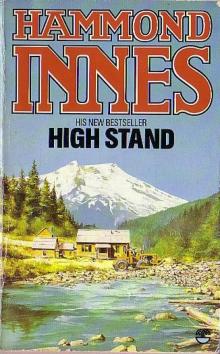 High Stand
High Stand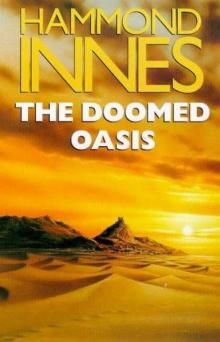 The Doomed Oasis
The Doomed Oasis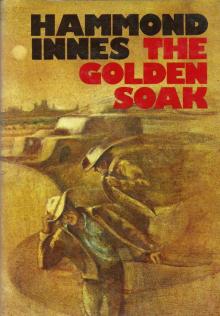 Golden Soak
Golden Soak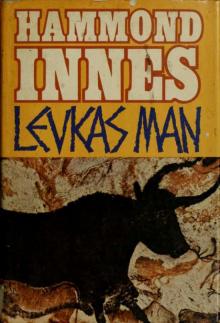 Levkas Man (Mystery)
Levkas Man (Mystery)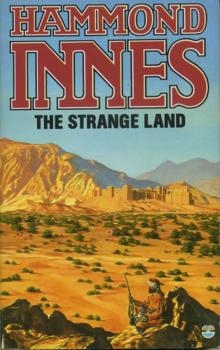 The Strange Land
The Strange Land Dead and Alive
Dead and Alive Attack Alarm
Attack Alarm The Strode Venturer
The Strode Venturer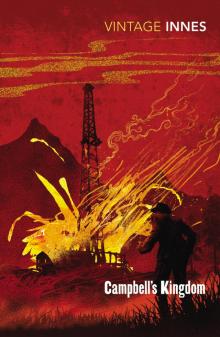 Campbell's Kingdom
Campbell's Kingdom North Star
North Star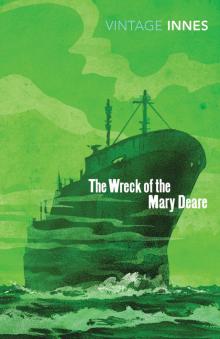 The Wreck of the Mary Deare
The Wreck of the Mary Deare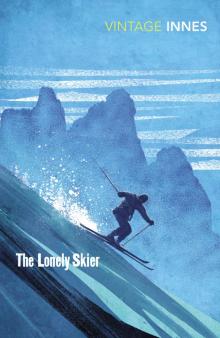 The Lonely Skier
The Lonely Skier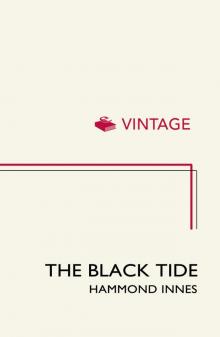 The Black Tide
The Black Tide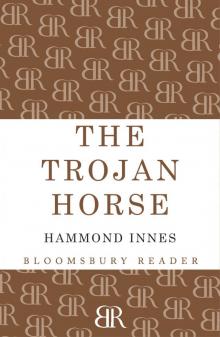 The Trojan Horse
The Trojan Horse Medusa
Medusa Air Bridge
Air Bridge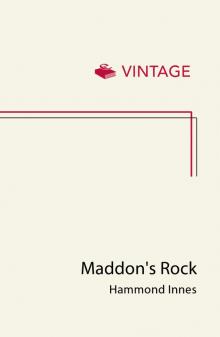 Maddon's Rock
Maddon's Rock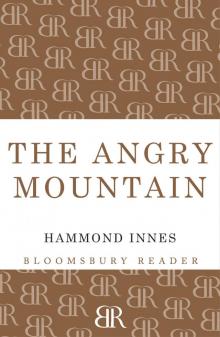 The Angry Mountain
The Angry Mountain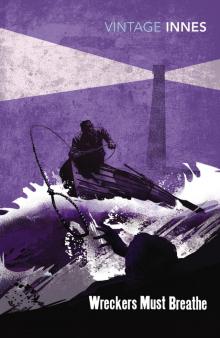 Wreckers Must Breathe
Wreckers Must Breathe Solomons Seal
Solomons Seal The White South
The White South